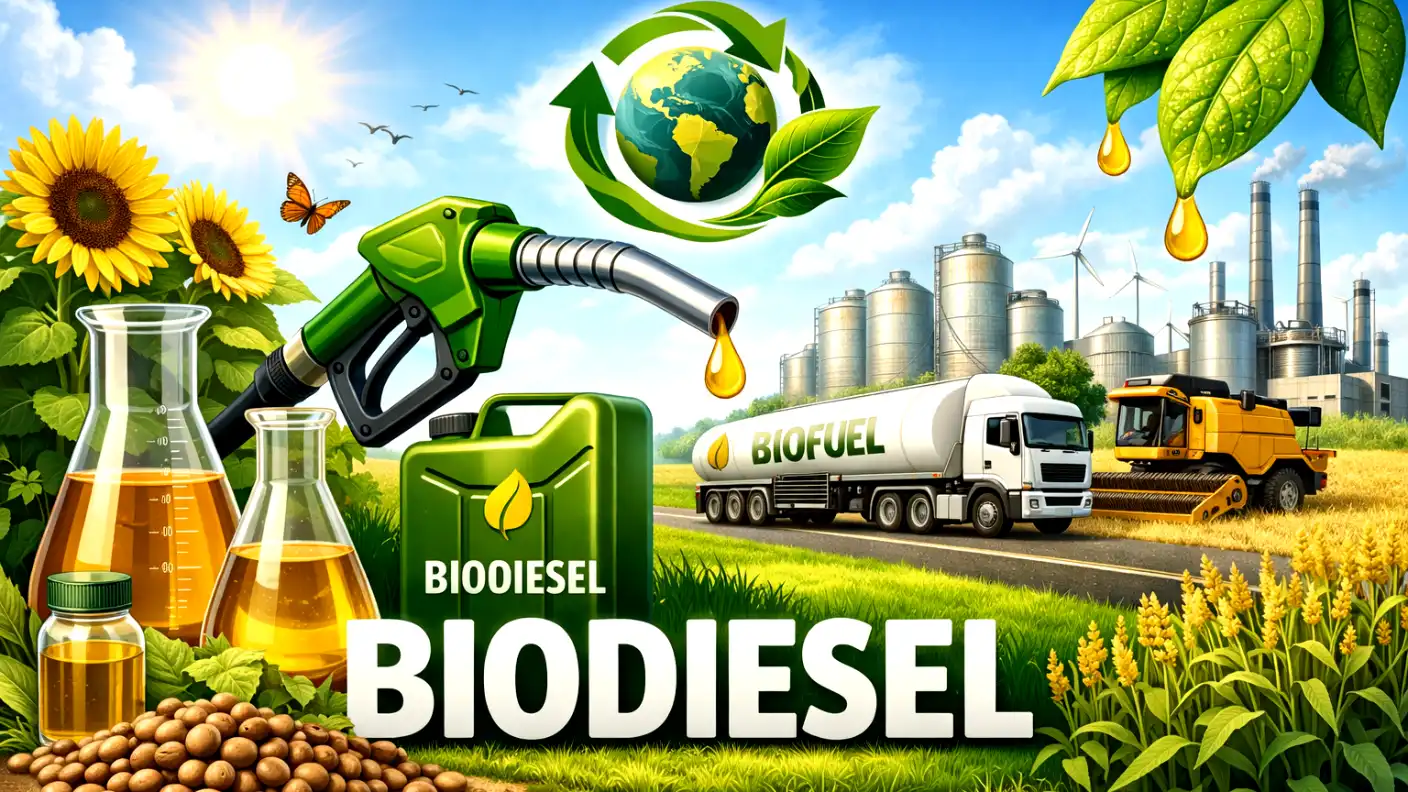Biodiesel emerges as a promising contender for sustainable and eco-friendly energy sources. It is derived from renewable biological resources and is a cleaner alternative to conventional fossil fuels. This article explores the complexities of biodiesel production, its environmental benefits, economic implications, and its role in guiding the energy sector toward a more sustainable future.
Unveiling the Essence of Biodiesel
Biodiesel is a renewable and biodegradable fuel crafted from organic materials, primarily vegetable oils, animal fats, or recycled cooking grease. Unlike traditional fossil fuels, it is a more environmentally conscious option, producing fewer greenhouse gas emissions during combustion. This sustainable energy solution holds immense potential to mitigate the environmental impact of conventional diesel fuels.
The Production Process: Crafting Biodiesel from Biomass
The production of biodiesel involves a chemical process known as transesterification, wherein triglycerides present in oils and fats react with alcohol, producing glycerol. This relatively straightforward process makes biodiesel a versatile and accessible fuel option. The feedstock for biodiesel production varies, including soybean oil, canola oil, palm oil, and used cooking oil, contributing to the fuel’s renewable and diverse nature.
Feedstocks Diversity and Agricultural Impacts
The choice of feedstocks for biodiesel production has a significant impact on its environmental footprint. Utilizing waste oils and residues, such as recycled cooking oil, can minimize the impact on agricultural practices and land use. However, cultivating dedicated energy crops for biodiesel can raise concerns about deforestation, biodiversity loss, and competition with food crops. Striking a balance between feedstock diversity and sustainable agricultural practices is crucial for maximizing the environmental benefits of biodiesel.
Environmental Benefits of Biodiesel
Biodiesel boasts a range of environmental advantages, positioning it as a pivotal player in the transition towards greener energy alternatives. The combustion produces lower levels of carbon dioxide, particulate matter, and sulfur dioxide than traditional diesel fuels. Reducing harmful emissions contributes to improved air quality and diminishes the overall carbon footprint associated with transportation and industrial activities.
Greenhouse Gas Emissions Reduction
One of the primary environmental benefits of biodiesel lies in its potential to reduce greenhouse gas emissions. The carbon dioxide released during the combustion of biodiesel is offset by the carbon dioxide absorbed during the growth of the feedstock, creating a closed carbon cycle. It contrasts with conventional diesel, which introduces new carbon into the atmosphere from fossil fuel extraction and combustion.
Air Quality Improvement and Health Benefits
The lower emission profile of biodiesel translates into tangible improvements in air quality. Reduced particulate matter and sulfur dioxide levels contribute to cleaner air, which in turn fosters better respiratory health and diminishes the ecological impact of pollution on both urban and rural environments. Its positive influence on air quality aligns with broader public health initiatives aimed at mitigating the detrimental effects of air pollution.
Economic Implications of Biodiesel
Beyond its environmental merits, biodiesel carries substantial economic implications, presenting opportunities for local industries, job creation, and energy security. The production and utilization of biodiesel contribute to energy diversification, reducing dependency on imported fossil fuels and fostering a more resilient and self-sufficient energy landscape.
Job Creation and Economic Stimulus
The biodiesel industry generates employment opportunities across various sectors, including agriculture and feedstock production, as well as processing, distribution, and retail. Localized production can stimulate regional economies, offering job opportunities and contributing to economic growth. This decentralized approach aligns with the broader goal of creating sustainable and inclusive economic models.
Energy Security and Independence
Biodiesel production enhances energy security by diversifying fuel sources, thereby reducing reliance on fossil fuels. Reducing reliance on imported fossil fuels helps nations mitigate geopolitical risks associated with energy dependence. A robust biodiesel sector contributes to a more resilient energy infrastructure, fostering stability and autonomy in the face of global energy fluctuations.
Biodiesel Blends and Infrastructure Compatibility
Integrating biodiesel into existing fuel infrastructure is a crucial aspect of its adoption. Its blends, such as B20 (20% biodiesel and 80% conventional diesel), provide a transitional approach, allowing seamless incorporation into current diesel engines and distribution systems. This compatibility facilitates a gradual shift towards higher concentrations, offering a flexible and pragmatic approach to widespread adoption.
Biodiesel Blends and Engine Performance
Biodiesel blends exhibit compatibility with conventional diesel engines, requiring minimal modifications to the engine. B20, B5 (5% biodiesel), and even higher blends perform comparably to traditional diesel fuels in terms of engine efficiency and power output. The adaptability of biodiesel blends ensures a smooth transition, encouraging consumers and industries to embrace this sustainable fuel option without significant infrastructural investments.
Infrastructure Development and Accessibility
Expanding the availability of biodiesel necessitates infrastructure development, including production facilities, distribution networks, and retail outlets. Governments and private entities play a crucial role in incentivizing and investing in infrastructure expansion. As accessibility increases, consumer choice broadens, accelerating the adoption of biodiesel and contributing to its integration into mainstream fuel options.
Challenges and Future Perspectives
While biodiesel holds immense promise, certain challenges impede its widespread adoption. Addressing these hurdles, including feedstock sustainability, technological advancements, and public awareness, is essential for realizing the full potential of biodiesel in shaping a sustainable and resilient energy future.
Sustainable Feedstock Practices
Ensuring the sustainability of feedstock production is crucial for preventing adverse environmental impacts associated with land-use changes and deforestation. Emphasizing waste oils and residues, implementing sustainable agricultural practices, and promoting biodiversity conservation are pivotal strategies in mitigating the environmental footprint of biodiesel production.
Technological Innovations and Research
Advancements in biodiesel production technologies are essential for enhancing efficiency, reducing costs, and expanding the range of viable feedstocks. Ongoing research focuses on improving transesterification processes, exploring new feedstock options, and developing next-generation biodiesel formulations. These technological innovations will play a decisive role in overcoming limitations and positioning biodiesel as a versatile and sustainable energy solution.
Conclusion
Biodiesel stands at the forefront of renewable energy solutions, embodying the potential to reshape the global energy landscape. Its environmental benefits, economic implications, and compatibility with existing infrastructure make it a viable and promising alternative to traditional fossil fuels.
As nations worldwide grapple with the imperative to transition towards sustainable energy sources, biodiesel emerges as a beacon of hope, offering a tangible and pragmatic pathway towards a cleaner, greener, and more sustainable future.





